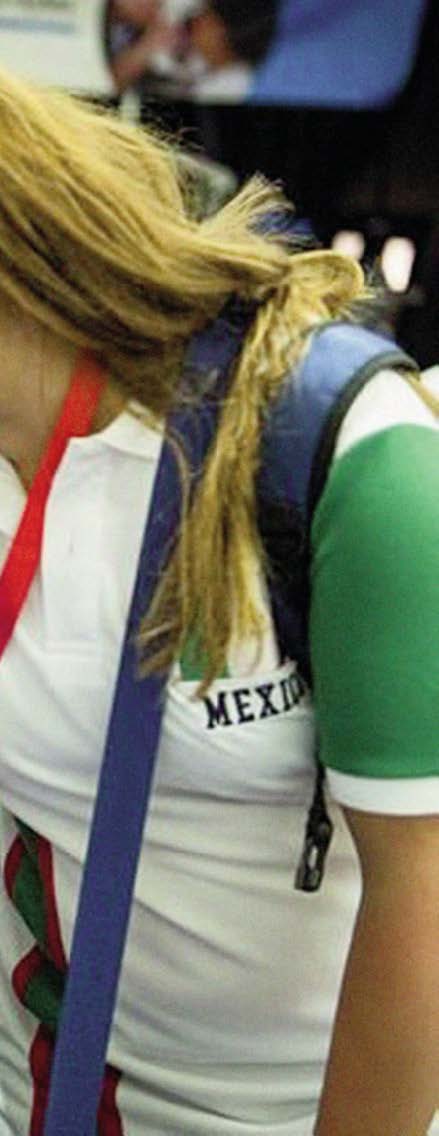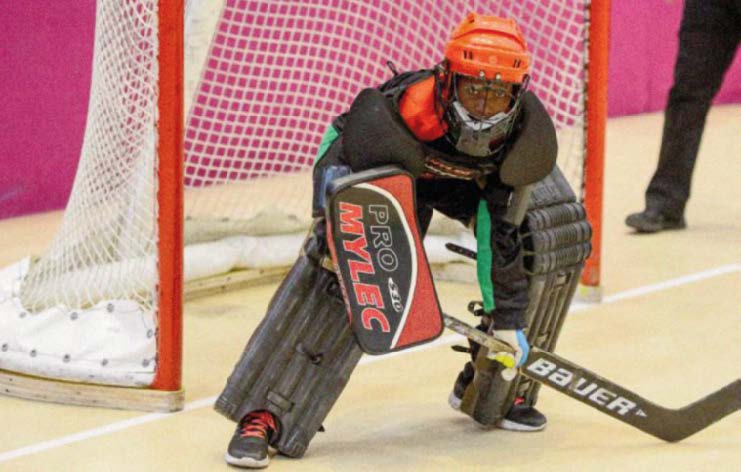Formally established in 2001, Special Olympics-Lions Clubs International Opening Eyes has provided more than 350,000 vision screenings for people with intellectual disabilities.

SEE FIT: Michelle Falcon, a swimmer from Mexico, has her vision examined at the Opening Eyes section of Healthy Athletes.
"It's amazing he was even walking around."
That was the reaction of Fotis Velissarakos, the volunteer doctor in charge of the Special Olympics Lions Clubs International Opening Eyes venue in Athens to Hicham Novara, a swimmer from Morocco competing at World Games in 2011.
Novara came to Velissarakos with extremely bad vision but wearing no prescription eyeglasses. Before the exam, he sat alone and only spoke when someone asked him a question. Following his eye exam, he was wearing corrective lenses and was smiling, talking to his coach, and proudly showing the volunteers pictures of his friends on his phone. Novara's vision—he was essentially blind, according to some definitions—was among the worst of the more than 1,000 athletes seen at Opening Eyes during that World Games. Thanks to Opening Eyes, the whole world today is a much brighter, more accessible place for Novara.
BENEFITS TO ATHLETES AND PROFESSIONALS
This year, Lions Clubs International—a vital ally of Special Olympics—celebrates their 100th anniversary. For 17 years, Special Olympics has partnered with Lions Clubs International to bring inclusive health to communities around the world and end discrimination against people with intellectual disabilities (ID).
What began as a pilot program has led to nearly two decades of global collaboration to prevent blindness and meet the vision care needs of people with ID. Formally established in 2001, Special OlympicsLions Clubs International Opening Eyes has provided more than 350,000 vision screenings for people with ID.
Opening Eyes directly benefits Special Olympics athletes by offering free screenings at Healthy Athletes events year-round and around the world. But athletes are not the only people who benefit. Opening Eyes provides opportunities for eye care professionals and students to learn how to address the unique treatment and vision care needs of people with ID. Special Olympics and Lions Clubs International created the first vision care curriculum to outline best practices for treating people with intellectual disabilities. Clinicians and students around the world who volunteer at Healthy Athletes events and Family Health Forums gain hands-on experience with people with ID. An experienced health professional at 2017 World Games in Austria said, "I've screened more people with ID this week than I've seen in my entire career."
The impact of the Opening Eyes partnership between Lions Clubs International and Special Olympics has been catalyzed by vision product companies Safilo, Liberty, and Essilor, who have helped grow the initiative's global reach through donations of eyeglasses and screening tools. With their support, Opening Eyes grew from a presence at three Special Olympics Programs to providing screenings in 80 nations in seven years. This global expansion has provided 500,000 preventative and diagnostic vision screenings for Special Olympics athletes and over 160,000 prescription eyeglasses distributed. Industry associations including the American Ophthalmology Association, the World Council of Optometry, and the College of Optometrists in Vision Development recognize the importance of reaching this underserved population and are providing resources for screenings and educational opportunities for eye care professionals.
MISSION: INCLUSION
The success of the multi-stakeholder Special Olympics-Lions Clubs International Opening Eyes led to Mission: Inclusion, a comprehensive service platform with a focus on youth activation and corporate partner engagement.
Special Olympics Chairman Dr. Timothy Shriver explains, "The Special OlympicsLions Clubs Inclusion platform aims to expand the global partnership impact into additional areas of service that can help create sustained benefits for individuals with intellectual disabilities and the larger communities." Mission: Inclusion invites volunteers from all industries and organizations to contribute their time and talents to programs such as Family Health Forums, which teach families and community members about health and wellness, Healthy Athletes, and Unified Sports, a program that combines sports training and competition experiences for people with and without ID. The initiative empowers athletes and Unified Partners to become agents of change in their communities by collaborating with youth and grassroots leaders.

SIGHT LINES: Lawrence Mwangi, a goalie from Kenya, amazed on the field despite having cataracts. He will be an even greater threat on the field with his vision corrected.
Similarly, Mission: Inclusion encourages local businesses, schools, and healthcare providers to support their local Lions Clubs and Special Olympics Programs. Last August, Special Olympics Bharat (India) partnered with Lions Clubs International to bring Mission: Inclusion to the forefront of their national movement for inclusion. Local entrepreneur and philanthropist Mrs. Aruna Oswal provided a $1-million grant to expand Unified Sports and inclusive health in India. One of the grant's goals is to engage 50,000 people, largely by mobilizing volunteers in rural areas of India where there are limited opportunities for people with ID and even fewer resources for family education and support.
Today, over 10,000 families benefit from Lions Clubs International Foundationfunded Family Health Forums and Healthy Athletes programs, and thousands more are engaged with the movement for inclusion through Unified Sports.
A LASTING LEGACY
Another athlete to receive life changing treatment was Lawrence Mwangi. The goal keeper of Special Olympics Kenya's Floor Hockey team had kept his team on top of their division. But no one knew 16-year-old Mwangi has been achieving on the sports field despite having cataracts. He was diagnosed in an Opening Eyes screening at the 2017 World Winter Games in Austria by Dr. Adib Jaber, the regional clinical advisor for Special Olympics Middle-East North Africa region.
After returning home from Austria, Mwangi was scheduled to receive free surgery for his condition at the Lions SightFirst Eye Hospital in his nation's capital, Nairobi. This specialist institution provides high quality clinical services, including education, rehabilitation, and rural community outreach, and is recognized as the leading eye hospital in the East Africa region. Mwangi will be an even greater threat on the field with his vision corrected.
With a long-lasting partnership, Lions International and Special Olympics will continue to ensure athletes with intellectual disabilities have the eye care they need to view the world like everyone else.